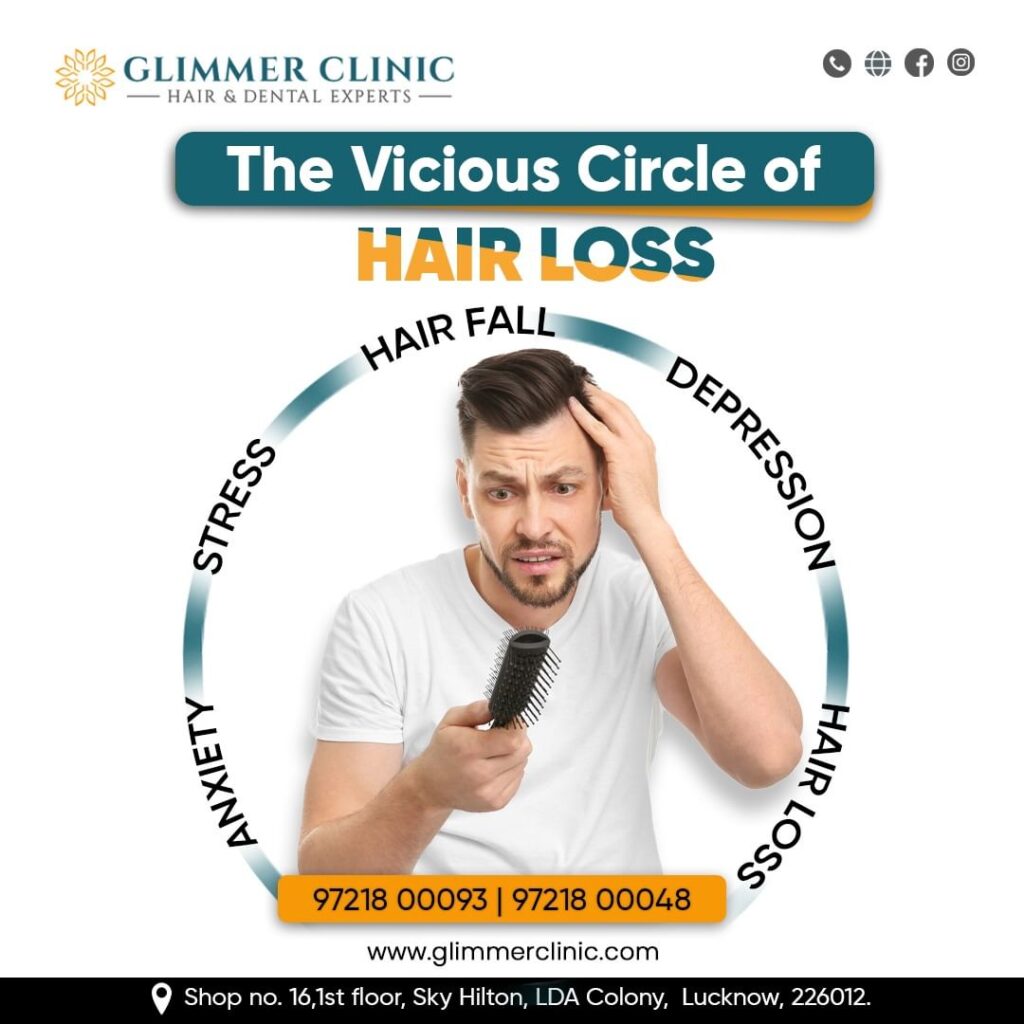Hair loss is a widespread occurrence that naturally accompanies the aging process, impacting millions of people globally. Despite often being perceived as a trivial issue, its effects on individuals’ emotions and psyche should not be overlooked. Hair loss treatment generally boosts emotional well-being.
Throughout this detailed examination, we aim to uncover the deep psychological implications of experiencing hair loss and its association with depression. Additionally, we will explore how hair loss treatment and hair restoration treatment offer a promising solution, potentially transforming the lives of those affected.
Delving into the Mental Health Implications of Hair Loss
For numerous individuals, hair loss serves as an unwelcome symbol of growing older and feeling more vulnerable, which can bring about ongoing feelings of distress. The apprehension of losing hair or noticing thinning strands can instill a lasting sense of unease, fostering anxiety about how one looks.
Hair loss often makes people feel sad and withdrawn. It can affect how they see themselves and how they interact with others. Feeling less confident can impact many areas of life, like relationships and work opportunities.
Recognizing how hair loss affects emotions, along with depression and anxiety, is important. Solutions like hair transplants can help. By addressing both the physical and emotional sides of hair loss, people can feel better about themselves.
Hair loss isn’t just about losing hair; it can also lead to feeling anxious, sad, and less sure of oneself. The level of sadness caused by baldness and other related feelings can vary from person to person. Getting help early on is key to preventing deep sadness because of hair loss and living a good life.
The Impact of Hair on Self-Esteem and Self-Perception
Hair loss treatment stands as a proven and reliable solution for restoring lost hair, presenting a vital avenue for reversing the psychological impact of hair loss and mitigating the potential dangers of depression resulting from baldness. This surgical procedure involves extracting hair follicles from donor regions and implanting them into areas experiencing thinning or baldness. Beyond its physical benefits, hair transplantation also addresses the emotional distress associated with hair loss and its potential contribution to depression and anxiety.
Hair Restoration Through Transplantation with Hair Loss Treatment
Hair loss treatment solutions, including procedures like hair transplants, provide individuals with the opportunity to restore their self-confidence. By reinstating a natural hairline and achieving a fuller head of hair, these treatments enable individuals to feel more attractive, youthful, and at ease with their appearance.
Benefits Of Hair Loss Treatment and Restoration Processes
Hair restoration, mainly through methods like hair transplants and hair loss treatment, offers many psychological benefits beyond physical transformation.
Here’s how it can positively impact individuals’ mental well-being:
1) Enhanced Self-Confidence: Regaining a full head of hair can significantly boost self-esteem and self-confidence. Individuals feel more attractive and comfortable in their skin, leading to a positive self-image.
2) Reduced Anxiety and Depression: Hair loss often triggers feelings of anxiety and depression. Effective hair loss treatments alleviate these emotional burdens, allowing individuals to enjoy better mental health.
3) Improved Social Life: Increased self-confidence leads to a more active social life. People become more willing to engage in social activities, build relationships, and pursue opportunities they may have avoided due to hair loss.
4) Career Advancement: A boosted self-image can translate into improved career prospects which is possibly done through hair loss treatment. Individuals are more likely to project confidence in professional settings, potentially leading to better job opportunities and advancement.
5) Quality of Life: Hair loss treatment enhances overall quality of life. The mental and emotional relief of regaining hair allows individuals to lead happier, more fulfilling lives.
6) Positive Body Image: Individuals often experience a more positive body image with restored hair. They no longer feel defined or limited by their hair loss, which can lead to a healthier relationship with their appearance.
Following a hair loss treatment, the emotional well-being of patients undergoes a notable shift alongside the visible physical changes. Many experience heightened levels of happiness, confidence, and reduced anxiety regarding their appearance. These positive changes go beyond mere aesthetics, positively impacting various aspects of their lives and enhancing their overall quality of life.
Personalized Care and Hair Loss Treatment Strategies
Respected hair loss treatment clinics prioritize the emotional health of their patients. Consulting with a specialist enables a comprehensive evaluation of the patient’s requirements, leading to the creation of customized treatment strategies. This ensures that the selected approach meets the patient’s expectations and desired results.
For further information regarding hair loss treatment, you can consult Glimmer Clinic. They provide comprehensive details and assistance related to hair restoration procedures.

